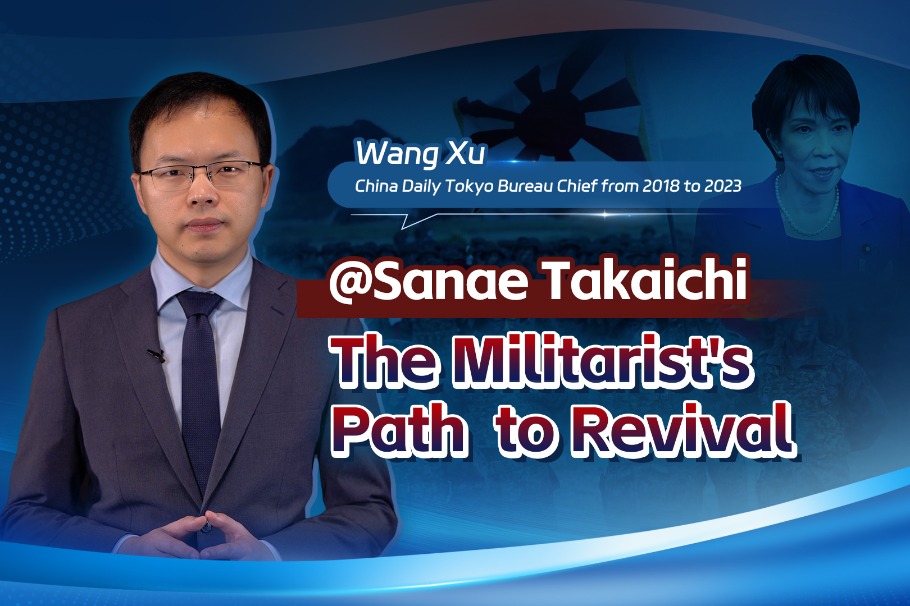China, US have much to learn from each other

One of the top priorities of Donald Trump after he takes oath as US president may not be what American people, in general, think. Although he has vowed to impose additional 10 percent tariffs on all goods from China as one of his first executive orders, he has left the door open for action by China and made clear the issues which concern him most.
Though US Vice-President Kamala Harris criticized Trump's tariff threats during her failed presidency bid, the Biden-Harris administration retained tariffs Trump imposed on $370 billion worth of Chinese goods, while also slapping 100 percent tariffs on Chinese-made electric vehicles.
Now, Contemporary Amperex Technology, the world's largest EV battery maker in terms of installation, is considering setting up a plant in the United States if Trump opens the door to Chinese investment. Chinese EV and battery makers have been shut out of the US market through a variety of protectionist trade measures supported by both Democrats and Republicans. Yet a Fortune magazine report said that Trump has reiterated his openness to Chinese automakers to manufacture cars in the US because that would boost the US economy, signaling a potentially different approach from the Biden administration which has sought to keep out Chinese-made cars.
Trump is more transactional than Biden when it comes to Chinese companies building cars in the US. Of course, there is a condition: automakers must make all their products in the US and employ American workers. The failure to comply would result in substantial tariffs on their imported vehicles. The US does have historical precedent of changing directions in times of societal shifts. Japan went from being persona non grata in the 1970s to the belle of the ball by establishing manufacturing units in the US.
China and the US are still struggling to overcome several problems, including the tariffs they have imposed on each other. But transitions are uniquely consequential moments in geopolitics. These are times when leaders can see potential opportunities. Perhaps that's why US companies operating in China remain optimistic about the future, recognizing that the US election result presents an opportunity for renewed focus on stability, cooperation and sustainable growth in US-China relations.
The US-China trade figures don't appear as a concern. While the political landscape remains dynamic, many businesses are certain that the new US administration will prioritize engagement, balanced trade policies, and predictability in global markets.
US companies have long valued the strong economic ties between the two countries, and continue to believe in the mutual benefit of innovation, job creation and cultural exchanges. We believe it's time the two countries got back to business and investing in each other.
US businesses operating in China are committed to contributing to a positive, stable and mutually beneficial economic partnership that will support the long-term prosperity of both countries. China is a critical trading partner of the US as well as a major competitor. In order to improve bilateral relations, the two sides will have to take some conciliatory measures. We see US-China economic relations as a solution, not as a part of the problem.
Leaders of both the US and China face daunting tasks, which require tough decisions in the coming months. China has been trying to boost its economic recovery after the devastating impact of the COVID-19 pandemic but its efforts are being hampered by the downturn in the real estate market and slowdown in the world economy. The country also faces structural headwinds that could become more pronounced as the 2020s progress. Some impetus from the US market may just be the thing the Chinese economy needs to boost its recovery.
That does not mean Trump will, metaphorically, give all the US' major trading partners flowers at the beginning of his term. He recently vowed to impose huge tariffs on goods imported from the US' three largest trading partners — Canada, Mexico and China — detailing how he will implement his campaign promises.
Trump won the presidential election primarily due to voters' anger and bitterness with inflation and the condition of the US economy. Therefore, the new US administration has promised monumental reforms involving nearly every aspect of government, which will likely face fierce opposition from many fronts. Turning around a $1.83 trillion hemorrhaging deficit in itself will be a herculean task.
China has some problems of its own. According to the United Nations, China's population is projected to decline to 1.31 billion by 2050, drop below 1 billion by 2070 and below 800 million by 2100.Besides, Chinese women are less willing to have children due to the rising costs of living. Although China's demographic situation is not exclusive to the country, it needs to be timely addressed. The US, Japan, Germany, the Republic of Korea and many other countries are facing similar problems.
We believe that investing in fields with proven track records is a sure bet to improve bilateral relations. It is therefore imperative that China and the US continue to open their markets to each other, allowing cross investment in areas of mutual benefit.
The two largest economies in the world can and must manage their differences, and prevent competition from veering into confrontation or conflict by maintaining open lines of communication and advancing cooperation in areas of shared interest. We think the solution is to allow Chinese companies to invest in the US so as to make bilateral cooperation flexible. It is good for both economies when China is totally focused on business.
Harley Seyedin is the president of the American Chamber of Commerce in South China and winner of the 2017 Oslo Business for Peace Award; and James Eric Black is the Schumann Endowed professor and chair of Mercer University's Department of Journalism and Media Studies and author of Walt Kelly and Pogo: The Art of the Political Swamp. The views don't necessarily represent those of China Daily.

Today's Top News
- China's well-being assistance crucial for many: China Daily editorial
- Takaichi government must pull back from the brink of militarist revival
- FM asserts right to halt Japanese militarism
- China ready to enhance strategic alignment with Italy: Premier Li
- Xi Jinping Thought on Ecological Civilization makes significant original contributions to global sustainable development: report
- Chinese FM urges Japan to reflect on, correct mistakes as soon as possible































